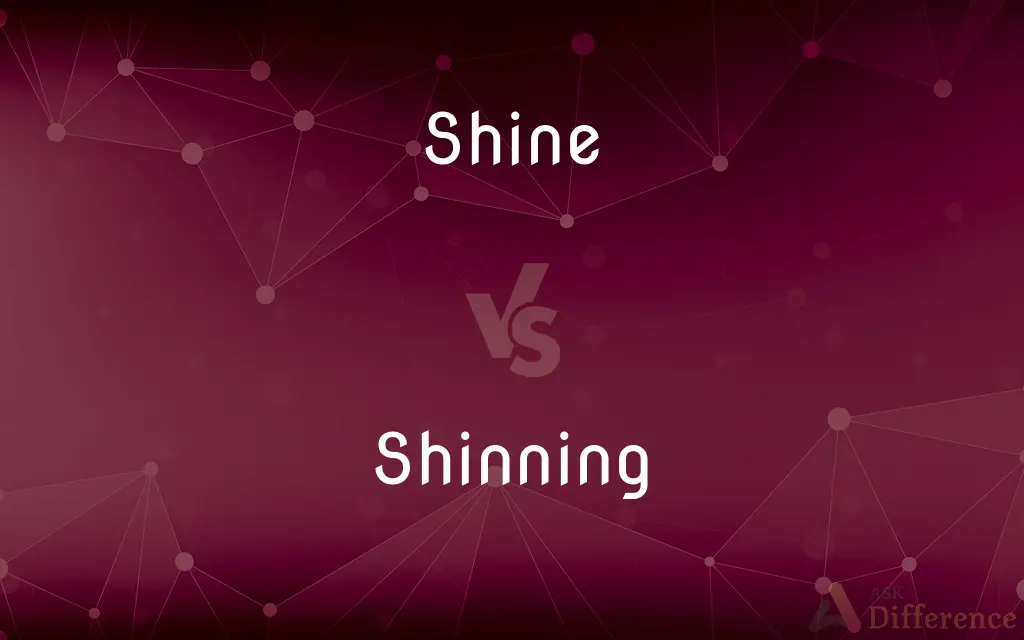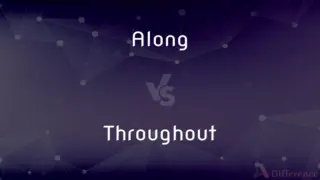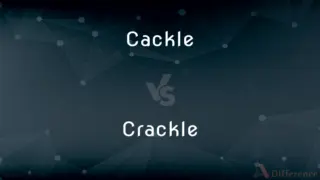Shine vs. Shinning — What's the Difference?
By Tayyaba Rehman — Updated on October 30, 2023
"Shine" is a verb meaning to emit light or to excel, while "Shinning" is a misspelling but often intended to mean climbing or illegally transporting liquor.

Difference Between Shine and Shinning
Table of Contents
ADVERTISEMENT
Key Differences
Shine is a verb meaning to emit light or to be very good at something. It implies radiance and the emission of light, whether literal or figurative. For instance, someone can shine at a talent show, meaning they perform exceptionally well. The term encapsulates brightness and excellence in various contexts, from physical luminosity to metaphorical distinction.
Shinning, on the other hand, is not a standard word in English. It is commonly a misspelling of "shining," which is the present participle of shine. However, it might also be a colloquial or regional variant referring to the act of climbing something, typically a pole or a rope, by gripping with the arms and legs. Alternatively, it could reference the illegal transportation of liquor, derived from "moonshining."
Shine, as a term, is versatile and can be used in various grammatical forms. Its uses span from its base form as a verb to its gerund/participle form "shining" when used in continuous tenses or as an adjective. It signifies a state of being that involves radiating light or excelling in a field.
Shinning, when intended to mean "climbing," is often used informally and in specific dialects. It's not recognized as a standard form of the word shine, but it retains a sense of action. When it comes to its illicit connotation related to liquor, it is derived from the noun "moonshine," reflecting a slang usage rather than formal speech.
Comparison Chart
Definition
To emit light or excel in something.
Incorrect spelling of "shining" or slang for climbing or transporting liquor.
ADVERTISEMENT
Part of Speech
Verb (base form).
Verb (informal/nonstandard usage).
Tense
Present simple.
Could imply present continuous or slang.
Usage
Formal and informal English.
Informal, often a typo or slang.
Conjugation
Shines, shone, shining.
Not applicable or nonstandard.
Compare with Definitions
Shine
To emit light brightly
The sun shine brightly in the clear sky.
Shinning
Climbing using limbs
He was shinning up the tree to rescue the cat.
Shine
To polish or make something glossy
She took time to shine her silverware.
Shinning
Illegally transporting liquor
They caught him shinning goods across the border.
Shine
To direct a light on something
The guard shine a flashlight on the path.
Shinning
(Regional use) Moving quickly
He was shinning down the road before dawn.
Shine
(of the sun or another source of light) give out a bright light
The sun shone through the window
Shinning
The front part of the leg below the knee and above the ankle.
Shine
Be very talented or perform very well
A boy who shone at nothing
Shinning
The shinbone.
Shine
Make (an object made of leather, metal, or wood) bright by rubbing it; polish
His shoes were shined to perfection
Shinning
A cut of meat from the lower foreleg of beef cattle.
Shine
A quality of brightness produced when light is reflected on something
My hair has lost its shine
Shinning
To climb (a rope or pole, for example) by gripping and pulling alternately with the hands and legs.
Shine
To emit light.
Shinning
To kick or hit in the shins.
Shine
To reflect light; glint or glisten.
Shinning
To climb something by shinning it.
Shine
To distinguish oneself in an activity or a field; excel.
Shinning
To move quickly on foot.
Shine
To be immediately apparent
Delight shone in her eyes.
Shinning
Present participle of shin
Shine
To aim or cast the beam or glow of (a light).
Shinning
(Slang) Hurting one's shin by collision
I ended up shinning myself on the coffee table.
Shine
Past tense and past participle shined To make glossy or bright by polishing.
Shine
Brightness from a source of light; radiance.
Shine
Brightness from reflected light; luster.
Shine
A shoeshine.
Shine
Excellence in quality or appearance; splendor.
Shine
Fair weather
Rain or shine.
Shine
Shines(Informal) Pranks or tricks.
Shine
(Slang) Whiskey; moonshine.
Shine
Offensive Slang Used as a disparaging term for a black person.
Shine
To emit or reflect light so as to glow.
Shine
To reflect light.
Shine
To distinguish oneself; to excel.
My nephew tried other sports before deciding on football, which he shone at right away, quickly becoming the star of his school team.
Shine
To be effulgent in splendour or beauty.
Shine
To be eminent, conspicuous, or distinguished; to exhibit brilliant intellectual powers.
Shine
To be immediately apparent.
Shine
(transitive) To create light with (a flashlight, lamp, torch, or similar).
I shone my light into the darkness to see what was making the noise.
Shine
(transitive) To cause to shine, as a light or by reflected light.
In hunting, to shine the eyes of a deer at night by throwing a light on them
Shine
(transitive) To cause (something) to shine; put a shine on (something); polish (something).
He shined my shoes until they were polished smooth and gleaming.
Shine
To polish a cricket ball using saliva and one’s clothing.
Shine
Brightness from a source of light.
Shine
Brightness from reflected light.
Shine
Excellence in quality or appearance; splendour.
Shine
Shoeshine.
Shine
Sunshine.
Shine
(slang) Moonshine; illicitly brewed alcoholic drink.
Shine
(cricket) The amount of shininess on a cricket ball, or on each side of the ball.
Shine
(slang) A liking for a person; a fancy.
She's certainly taken a shine to you.
Shine
A caper; an antic; a row.
Shine
To emit rays of light; to give light; to beam with steady radiance; to exhibit brightness or splendor; as, the sun shines by day; the moon shines by night.
Hyperion's quickening fire doth shine.
God, who commanded the light to shine out of darkness, hath shined in our hearts, to give the light of the knowledge of the glory of God in the face of Jesus Cghrist.
Let thine eyes shine forth in their full luster.
Shine
To be bright by reflection of light; to gleam; to be glossy; as, to shine like polished silver.
Shine
To be effulgent in splendor or beauty.
Once brightest shined this child of heat and air.
Shine
To be eminent, conspicuous, or distinguished; to exhibit brilliant intellectual powers; as, to shine in courts; to shine in conversation.
Few are qualified to shine in company; but it in most men's power to be agreeable.
Shine
To cause to shine, as a light.
He [God] doth not rain wealth, nor shine honor and virtues, upon men equally.
Shine
To make bright; to cause to shine by reflected light; as, in hunting, to shine the eyes of a deer at night by throwing a light on them.
Shine
The quality or state of shining; brightness; luster, gloss; polish; sheen.
Now sits not girt with taper's holy shine.
Fair opening to some court's propitious shine.
The distant shine of the celestial city.
Shine
Sunshine; fair weather.
Be it fair or foul, or rain or shine.
Shine
A liking for a person; a fancy.
Shine
Caper; antic; row.
Shine
Shining; sheen.
Shine
The quality of being bright and sending out rays of light
Shine
Be bright by reflecting or casting light;
Drive carefully--the wet road reflects
Shine
Emit light; be bright, as of the sun or a light;
The sun shone bright that day
The fire beamed on their faces
Shine
Be shiny, as if wet;
His eyes were glistening
Shine
Be distinguished or eminent;
His talent shines
Shine
Be clear and obvious;
A shining example
Shine
Especially of the complexion: show a strong bright color, such as red or pink;
Her face glowed when she came out of the sauna
Shine
Throw or flash the light of (a lamp, etc.);
Shine the light on that window, please
Shine
Touch or seem as if touching visually or audibly;
Light fell on her face
The sun shone on the fields
The light struck the golden necklace
A strange sound struck my ears
Shine
Experience a feeling of well-being or happiness, as from good health or an intense emotion;
She was beaming with joy
Her face radiated with happiness
Shine
(of surfaces) make shine;
Shine the silver, please
Polish my shoes
Shine
To excel or be outstanding
He will shine in the lead role of the play.
Shine
Reflect light
The lake's surface shine under the moonlight.
Common Curiosities
Can shine be used as a noun?
Yes, "shine" can also be a noun meaning brightness or luster.
How do you use shinning in a sentence?
Informally, "He was shinning up the rope during the gym class."
Is "shinning" a recognized verb?
"Shinning" is not standard; it may be a misspelling of "shining" or slang for climbing using one's shins.
How do you use shine in a sentence?
"She hopes to shine in the math competition."
Is "shinning" a correct past tense of shine?
No, the correct past tense of shine is "shone" or "shined" depending on the context.
What does shinning mean in slang?
In slang, it could mean climbing or illegally transporting liquor.
Does shinning have a participle form?
As it's nonstandard or slang, it doesn't have a recognized participle form.
What is the participle form of shine?
The participle form is "shining," as in "The shining sun."
Can "shinning" be used in formal writing?
No, it's considered informal and often incorrect.
What is the future tense of shine?
"Will shine," as in "The new artist will shine one day."
What part of speech is shine usually used as?
It's typically used as a verb, but can also be a noun.
Can shine be used metaphorically?
Yes, it can denote standing out in performance, like "shine in a job interview."
Is "shine" always about light?
No, it can also refer to excellence in non-physical contexts.
Does shinning have a future tense?
As a nonstandard verb, it does not have a recognized future tense.
Is shinning recognized in dictionaries?
Not as a form of shine; any listings are usually as regional or slang terms.
Share Your Discovery

Previous Comparison
Along vs. Throughout
Next Comparison
Cackle vs. CrackleAuthor Spotlight
Written by
Tayyaba RehmanTayyaba Rehman is a distinguished writer, currently serving as a primary contributor to askdifference.com. As a researcher in semantics and etymology, Tayyaba's passion for the complexity of languages and their distinctions has found a perfect home on the platform. Tayyaba delves into the intricacies of language, distinguishing between commonly confused words and phrases, thereby providing clarity for readers worldwide.















































